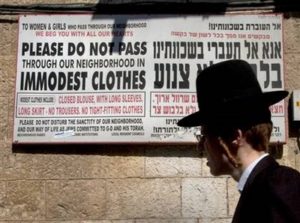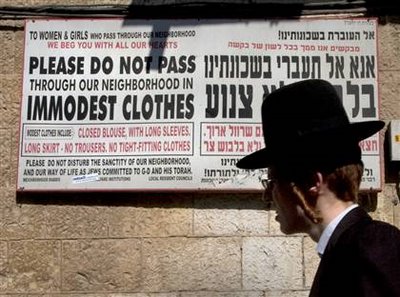I have a problem with tzniut (modesty). Don’t get me wrong. My blouses cover my arms down to my wrists, my skirts fall way below the knee, and the only place I don’t keep my hair covered is in my bedroom. I don’t sing in public; don’t yell across the street; don’t walk between two men.
Many are the rants about sheitels which cost a small fortune, about conforming to a uniform or wearing black. My problem is that these outward behaviors and appearances have eclipsed the essence of modesty in the Orthodox community and have trampled on some other middos which are equally important.
One of my first frustrations was a newsletter sent home from my daughter’s Bais Yaacov elementary school. The principal noted that the girls were checking each other to make sure that their skirts were long enough to amply cover their socks, and that “the Ribbono shel Olam must have been shepping so much nachas!” Really? Is this what makes God happy? Doesn’t the Omnipotent One have more important things about which to worry? And what about the girls whose skirts didn’t cover their socks? Were they now ashamed? Did they go home and tell their mothers, who may have been too busy or not had a budget to buy skirts and socks? And what about the girls who were wearing the headbands in huge flowers that were popular at the time? No, a bright red thing on your head is not attracting attention to your appearance, but that half-an-inch gap between your skirt and your socks? A Shanda!
A sage rabbi from Kew Gardens Hills used to respond to “issues” like this with the observation, “Yes, it’s a terrible problem. It deserves our attention. But first let’s worry about Jews who are starving, woman and children that are being abused, women whose husbands will not give a get, and, of course, lashon hara.”
 A recent incident where I live points out the dangers of appointing ourselves as the “tzniut police.” A fourteen-year-old boy threw a rock at a woman he deemed immodest as she was walking down the street. She had to go to the hospital for stitches. Thankfully the rock did not do serious nor permanent damage. A friend pointed out that tzniut is a big issue for the hareidi community, that no, men cannot control themselves, and that they deserve the respect of not walking around their neighborhood in a way that offends them. Okay, those are valid points, but what happened to the guiding principles that are directly from the Torah: “You shall not hate your brother in your heart; you shall reprove your fellow and do not bear sin because of him. You shall not take revenge and you shall not bear a grudge against the members of your people; you shall love your fellow as yourself — I am God (Leviticus 19:17-18)?
A recent incident where I live points out the dangers of appointing ourselves as the “tzniut police.” A fourteen-year-old boy threw a rock at a woman he deemed immodest as she was walking down the street. She had to go to the hospital for stitches. Thankfully the rock did not do serious nor permanent damage. A friend pointed out that tzniut is a big issue for the hareidi community, that no, men cannot control themselves, and that they deserve the respect of not walking around their neighborhood in a way that offends them. Okay, those are valid points, but what happened to the guiding principles that are directly from the Torah: “You shall not hate your brother in your heart; you shall reprove your fellow and do not bear sin because of him. You shall not take revenge and you shall not bear a grudge against the members of your people; you shall love your fellow as yourself — I am God (Leviticus 19:17-18)?
Tzniut has been corrupted to mean outward appearance from its true meaning, also from Tanach: “He has told you, O man, what is good, and what the Lord demands of you; but to do justice, to love loving-kindness, and to walk humbly with your God” (Michah 6:8). So tzniut is a whole attitude towards life. It is realizing how awesome God is and that while you may have many talents and gifts, including outward appearance, they are all from God. Yes, I think the Ribbono shel Olam does shep nachas when we are modest. But not because we wear a certain garment that is a certain length. Because we are making our relationship with God the core of our lives and doing “what the Lord demands.”

